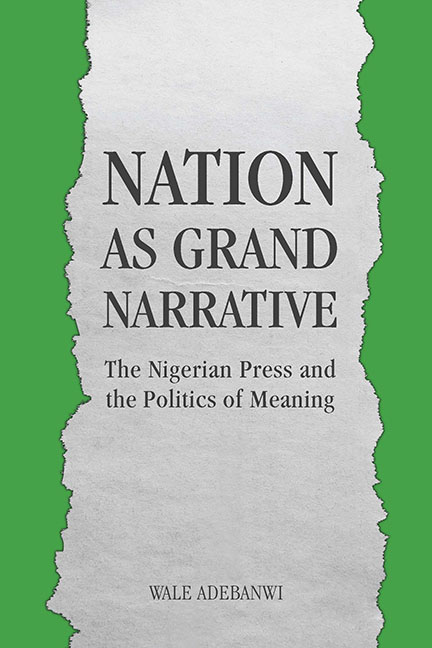Book contents
- Frontmatter
- Dedication
- Contents
- List of Illustrations
- Acknowledgments
- Part I Contextual and Conceptual Perspectives
- Part II Colonial Agency and Counterhegemonic Struggles
- Part III Inclusion, Exclusion, and Democratic Contestations
- 5 Paper Soldiers: Narratives of Nationhood and Federalism in Pre–Civil War Nigeria
- 6 Representing the Nation: Electoral Crisis and the Collapse of the Third Republic
- 7 The “Fought” Republic: The Press, Ethno-Religious Conflicts, and Democratic Ethos
- Part VI Domination and Resistance in Majority-Minority Relations
- Conclusion: Beyond Grand Narratives
- Notes
- Bibliography
- Index
5 - Paper Soldiers: Narratives of Nationhood and Federalism in Pre–Civil War Nigeria
from Part III - Inclusion, Exclusion, and Democratic Contestations
Published online by Cambridge University Press: 16 February 2018
- Frontmatter
- Dedication
- Contents
- List of Illustrations
- Acknowledgments
- Part I Contextual and Conceptual Perspectives
- Part II Colonial Agency and Counterhegemonic Struggles
- Part III Inclusion, Exclusion, and Democratic Contestations
- 5 Paper Soldiers: Narratives of Nationhood and Federalism in Pre–Civil War Nigeria
- 6 Representing the Nation: Electoral Crisis and the Collapse of the Third Republic
- 7 The “Fought” Republic: The Press, Ethno-Religious Conflicts, and Democratic Ethos
- Part VI Domination and Resistance in Majority-Minority Relations
- Conclusion: Beyond Grand Narratives
- Notes
- Bibliography
- Index
Summary
Narratives of conflict between antagonistic or competing communities compel the construction of simplistic binaries: good versus evil, truth versus falsehood, progress versus regression, and freedom versus oppression. In reporting ethnic conflicts, the media, particularly those representing interested parties, rarely present “a coherent political analysis.” Yet media narratives can precipitate and exacerbate conflict. Daya Kishan Thussu and Des Freedman identify the media in the context of the communication of conflict as a “battleground.” Regarding the contemporary world, saturated with the media's reporting of conflict, Simon Cottle argues that the media-conflict interface needsto be understood through the perspective of “mediatized conflict.” He uses this perspective to draw attention to “the more complex, active and performative ways [through which] themedia are involved in conflicts today,” because the media are “capable of enacting and performing conflicts as well as reporting and representing them.”
Against this backdrop, narratives of conflict should not be viewed as “mere reflections of reality” indeed, they constitute “intrinsic parts of theproductionof political realityand the establishment of political truths.” Consequently, as studies of media coverage of conflict in Africa have shown, we need to pay attention to the role of media narratives before, during, and after conflicts as a process of “history-making.” In Africa, students of the media and others have reflected on the function of the media in instigating and exacerbating political, ethnic, andreligious conflicts. Recent examples include the activities of “hate media” such as the private radio station Radio Television Libre des Milles Collines (RTLM) and the newspaperKanguraduring the Rwandan genocide, both of which “explicitly and repeatedly, in fact, relentlessly, targeted the Tutsi population for destruction.” There is also the complicity of community radio, the use of mobile phones, the Internet, and social media in the post-2007 election ethnicviolence in Kenya, and the involvement of the local news media in the conflicts in nine Central African countries.
Although some scholars have focused on the media's role in Nigeria in reporting political crises in general, the role of the Nigerian press in reporting and exacerbating the crises that eventually led to the country's civil war is yet to be fully acknowledged and accounted for in the literature on Nigerian history, particularly the history of the civil war.
- Type
- Chapter
- Information
- Nation as Grand NarrativeThe Nigerian Press and the Politics of Meaning, pp. 107 - 145Publisher: Boydell & BrewerPrint publication year: 2016

